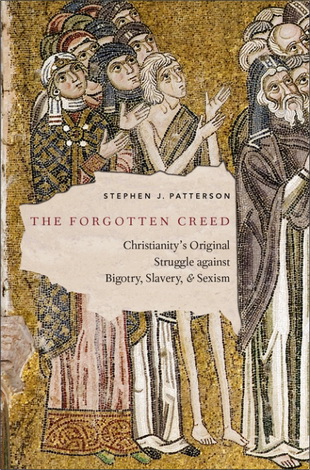
Patterson - The Forgotten Creed
On a warm, June Sunday in St. Louis I wandered with an old friend through the church where, earlier that morning, my children had been baptized. We came to the baptismal font, around which our family had gathered for the ceremony during the regular Sunday service. It was about four feet high, just low enough for my daughter to reach up and fiddle her fingers in the water and watch the droplets dribble back into its shallow pool. My friend, who had grown up in a secular upper-class home in Tito’s Yugoslavia, had little knowledge of fonts and baptism and the goings-on that morning. So he asked, what does it mean, baptism?
The question gave me pause. When you baptize a baby, it is a kind of naming ceremony, like those found in many societies. When you are baptized, like I was, on the eve of puberty, it is a coming-of-age ceremony, a rite de passage—again, a common practice across cultures. Sometimes, though rarely, an adult is baptized. Then it signals a religious conversion, the culmination of a profound personal transformation. I rambled. “But what do you think it means?” he asked. It was a fair question. I had just seen my own children baptized.
Stephen J. Patterson - The Forgotten Creed. Christianity's Original Struggle against Bigotry, Slavery, and Sexism
New York, NY : Oxford University Press, 2018. - 182 pp.
ISBN 9780190865825 (hardcover : alk. paper)
ISBN 9780190865849 (epub)
ISBN 9780190879037 (oso)
Stephen J. Patterson - The Forgotten Creed. Christianity's Original Struggle against Bigotry, Slavery, and Sexism - Contents
Introduction: The Unbelievable Creed
1. Christianity’s Forgotten First Creed
2. The Oldest Cliche
3. Children of God
4. There Is No Jew or Greek
5. There Is No Slave or Free
6. There Is No Male and Female
Conclusion: You Are All One
Works Cited
Index of Modern Authors
Index of Ancient Texts
Stephen J. Patterson - The Forgotten Creed. Christianity's Original Struggle against Bigotry, Slavery, and Sexism - Christianity’s Forgotten First Creed
Sometime in the middle of the first century, somewhere in the lands lying along the northern coast of the Mediterranean Sea, Paul of Tarsus went looking for his scribe. Paul—the Apostle Paul—was about to write an angry, aggressive, snarky missive that would eventually land in, of all places, the Bible. Had he known that he was writing scripture, that his words would one day be parsed as the Word of God—indeed, that his words would someday be read by anyone other than the unsuspecting readers who were to be this explosive letter’s first recipients—perhaps he would have softened his tone. But he didn’t. Instead, he loaded up and let them have it with both barrels. Much of it is pretty hard to read, but not all of it. Some of the things Paul thought to put in this letter were, in fact, beautiful. And so it is that one of the real gems from the earliest days of nascent Christianity came to be nestled in one of the angriest pieces of literature from the ancient world. We know this letter today as Paul’s Epistle to the Galatians.
Among its sharp rhetorical jabs, its dripping sarcasm, and thinly veiled threats there is, alas, an ancient creed, a beautiful thought, an idea that might have changed much of human history, had it not been ignored and forgotten by the generations that came after Paul and learned to revere him, in spite of his thorny personality. So how is it that we still have this lost and forgotten creed—possibly the oldest in the history of Christianity?
The Apostle Paul, of course, was a follower of Jesus. Originally, though, he was not. When Paul first heard about the Jesus movement, he did not like it. He had not known Jesus personally, though they might have been roughly the same age. Jesus was not a well-known public figure in his own lifetime. His reputation and fame would spread only many years later. So Paul missed out on hearing or meeting Jesus for himself. Whether or not that would have made a difference, we cannot know. But when Paul encountered the followers of Jesus, his reaction must have been severe. In this letter, Galatians, he himself says that back then he “persecuted the church of God and violently and tried to destroy it” (Gal 1:13). He does not say why he was so opposed to it—and all speculation about why is mere guesswork. He says only that one day all that changed. And we are just as in the dark about how and why this happened too. Paul himself says only— quite mysteriously—one day God chose “to reveal his son in me” (Gal 1:16). Many years later, the author of the biblical book of Acts would use his imagination to create one of the most iconic scenes in biblical history. Paul—in this story referred to by his Jewish name, “Saul”—was bound for the city of Damascus, “breathing threats and murder against the disciples of the Lord,” and armed with letters to arrest any followers of “the Way” he might find there. Acts relates what happens next:
"Suddenly a light from heaven flashed around him and he fell to the ground and heard a voice saying to him, “Saul, Saul, why do you persecute me?” And he said, “Who are you, Lord?” And he said, “I am Jesus, whom you are persecuting. Get up and go into the city and you will be told what to do.” Those traveling with him stood speechless, for they heard the voice but saw no one. Saul got up from the ground. When he opened his eyes he could see nothing, so they took him by the hand and brought him to Damascus. And for three days he was blind, and ate and drank nothing."
Acts 9:3-9
In Acts’ colorful account, a disciple named Ananias is directed in a vision to go to Saul, lay hands upon him, and restore his sight. And so, Acts says, the “scales fell from his eyes,” and Saul—Paul—was baptized.





Комментарии
Пока нет комментариев. Будьте первым!